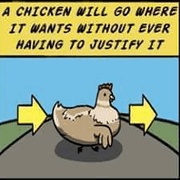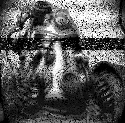|
Bargearse posted:Goering was put in charge of Jasgdgeschwader 1 after von Richthofen's death and he was not well liked by the rest of the squadron. I read somewhere that he was the only member of the squadron to have never been invited to the squadron's post war reunions. I have no idea how true that part is, I can't find any sources other than one book I read years ago. The rest of the squadron felt Goering was a blowhard who cared only for his own advancement.
|
|
|
|

|
| # ? May 18, 2024 02:54 |
|
Brain injury is a very unnerving topic on an existential level for a lot of people. Here's a particularly strange rare side-effect that sometimes pops up even in non-catastrophic cases: Anton-Babinski Syndrome. Cortical vision impairment occurs when the part of the brain that processes vision is damaged. So there's nothing wrong with the eye or the optic nerve; images are received just fine, but due to a problem with the processing equipment, the brain can no longer make sense of them. Cortical vision impairment is very common. Cases can range in severity all the way from a slight loss of depth perception all the way through to a total lack of sight. (The damage can also manifest in bizarre ways like patients only being able to see moving objects while being unable to detect anything stationery, or only being able to perceive one side of anything - which results in things like a person only shaving and grooming the right side of their face and hair in the morning because they have lost the ability to see the left half altogether.) Anton-Babinski Syndrome is when a patient loses their sight completely, so they're qualifiably blind, but they have no insight into their condition. Due to the nature of the brain injury, they don't realise that they can no longer see and they behave as if they're still fully sighted. The bizarre thing is that these patients will go to extraordinary lengths to deny their blindness and often can't be convinced that it exists, even faced with concrete evidence. If asked if they're having any vision problems, they'll say no, they can see just fine. If told to prove their sight by identifying something in their environment, they'll often just make up a bunch of poo poo wholecloth - for example, if the tester holds up a spoon and asks them to describe it, they might fluently and convincingly describe a non-existent flower vase with no apparent recognition that they're lying. When they trip over or bump into things while walking around, they'll brush it off as due to poor lighting or accuse others of deliberately obstructing their path. Many suffer from visual hallucinations that can be quite complex, although they have no other symptoms of psychosis. When confronted with the results of tests or clear proof that they can't see (like if somebody mentions that they just walked straight into a wall in a well-lit familiar room), they'll deny it, make strange excuses, refuse to participate, or claim that the tests are wrong or the testers are lying to them. They can sometimes get quite hostile. Which is understandable - imagine if a doctor tried to convince you that you were paraplegic even though you know full well that you can get up and walk, and how much that would annoy you (if you're actually paraplegic, ignore this comparison). Obviously these patients are quite dangerous to themselves, as they have no awareness of their condition and will continue to live as normal without taking precautions to compensate for their lack of sight. The syndrome can sometimes be treated with therapy, but more often it's permanent; they remain totally blind for the rest of their lives and never realise it.
|
|
|
|
Only ever been to three funerals, all family, all Catholic, all in the UK. Close family would have the chance to view the dead person at the undertakers before the coffin was taken to the local church. I never opted to view, but other family members did. I just didn't want the last image of my dead family members to be of them in the coffin. I think for some people seeing the dead person is almost a final realisation or acceptance that their loved one is gone. From the undertakers we'd go to the church for a service, then onwards to the crematorium. From there always to the pub across the road to eat, drink and chat to long lost relatives.
|
|
|
|
Khazar-khum posted:The rest of the squadron felt Goering was a blowhard who cared only for his own advancement. also he was hogging all the painkillers.
|
|
|
|
HaB posted:I am really fascinated by non-western funerary customs. I had the privilege of attending a Hindu funeral for a friend's father and it was AMAZING. No fear/taboo about death, and the ritual really felt like it was a celebration of someone's life, and a way of both preparing his spirit for the journey to the afterlife, as well as preparing the bereaved to deal with the passing itself. Was really beautiful and moving and not at all "sad" like you'd think a funeral would be. Dude got one heck of a send off. I used to live in Cambodia so have quite a few Cambodian friends on facebook. One of them had just lost a family member and in their culture the whole family gets together to clean and clothe the body, perfume it, wrap it in sheets and so on ready for cremation. They have absolutely no taboos about death whatsoever and he posted the whole process - photos of the body and all - on facebook. I really didn't think it was appropriate to click 'like' for that one but it was up to 30+ anyway; I remember looking at all the people who had liked it and of the names I recognised they were mainly American. Not a single Brit clicked it and I know that he knows plenty. When my dad died (UK) it was closed cask funeral but we had a viewing before. I think this is getting more common as we gradually open up to the concept of death. I have a pretty morbid sense of humour and remember walking into the room and saying, "No, please, don't get up!".
|
|
|
|
Well if we're gonna spend pages talking about boring regular funerals then lets start throwing out odd/awesome funerals. http://en.wikipedia.org/wiki/Sky_burial quote:a funeral practice in which a human corpse is placed on a mountaintop to decompose while exposing to the elements or to be eaten by scavenging animals, especiallybird of prey. It is a specific type of the general practice of excarnation. It is practiced in theChinese provinces of Tibet, Qinghai, Sichuanand Inner Mongolia, and in Mongolia proper. The locations of preparation and sky burial are understood in the Vajrayana Buddhisttraditions as charnel grounds. Comparable practices are part of Zoroastrian burial practices where deceased are exposed to the elements and birds of prey on stone structures called Dakhma. Few such places remain operational today due to religious marginalisation, urbanisation and the decimation of vulture populations. Been mentioned before, but always an interesting read.
|
|
|
|
Khazar-khum posted:The rest of the squadron felt Goering was a blowhard who cared only for his own advancement. The rest of the squadron was right, Goering was a grasping swine his entire life.
|
|
|
|
Zeroisanumber posted:The rest of the squadron was right, Goering was a grasping swine his entire life. Much of his post-Great War success had to do with the fact that he joined the NSDAP early enough to be entitled to what was at the time a cushy position consisting of mostly collecting stolen artwork and having parties at his party castle (then 1939 happened and he had to get off his rear end and do the portion of his job that included directing the Luftwaffe, at which he failed miserably).
|
|
|
|
Dude did have a baller train set though.
|
|
|
|
Khazar-khum posted:This. The Richtofen house in the Denver area is neat, or was the last I saw it.
|
|
|
|
Avshalom posted:Brain injury is a very unnerving topic on an existential level for a lot of people. Here's a particularly strange rare side-effect that sometimes pops up even in non-catastrophic cases: Anton-Babinski Syndrome. Psych talk! The interesting part about Anton's syndrome is, like you said, how they can describe something that "isn't" there so well. The reason being that they are seeing their own internal representation of the world. For whatever reason, their phenomenal self model hasn't or isn't able to update (cars are good example. How long does it take you to realize you have no oil if the engine light never comes on?). Sometimes they'll realize after a while that they've been blind the whole time (which then those experiences prior rush back to them, and they understand that they were blind then as well). Pretty much, things break and sometimes the part associated with telling you that "hey, you're blind" doesn't quite work either. Another one that scares me more than anything else is polyneuropathy of propriceptive nerves. In short, you can't feel your body. In long, your body loses its sense of what its doing or where it is. The majority of us know where and what our limbs and body are doing at all times. We don't pay attention to it, but when you're walking you don't need to stare at your legs to see what they're doing. When you're sitting, you don't need to focus to keep yourself from slouching over (like a sack of potatoes, they describe it. Also I do. But thats just bad posture). What happens with this disorder, is the nerves associated with proprioception (body-sense) are damaged, resulting in the inability to know what your body is doing. Sitting up straight, not letting your jaw go slack and such require constant attention and willpower. Walking is an incredibly difficult task, and the victims of the illness have to simplify their motor functions, otherwise they can lose concentration and literally just fall over. Same goes for picking up and holding objects - if you can't feel your hands, you have to judge how much pressure you're using based on visual cues and practice. One of the individuals studied referring to herself as having "... something's been scooped right out of me, right at the center... that's what they do with frogs, right? They scoop out the center, the spinal cord, they pith them... that's what i am, pithed, like a frog."
|
|
|
|
Brainbread posted:Another one that scares me more than anything else is polyneuropathy of propriceptive nerves. In short, you can't feel your body. In long, your body loses its sense of what its doing or where it is. The majority of us know where and what our limbs and body are doing at all times. We don't pay attention to it, but when you're walking you don't need to stare at your legs to see what they're doing. When you're sitting, you don't need to focus to keep yourself from slouching over (like a sack of potatoes, they describe it. Also I do. But thats just bad posture). What happens with this disorder, is the nerves associated with proprioception (body-sense) are damaged, resulting in the inability to know what your body is doing. Sitting up straight, not letting your jaw go slack and such require constant attention and willpower. Walking is an incredibly difficult task, and the victims of the illness have to simplify their motor functions, otherwise they can lose concentration and literally just fall over. Same goes for picking up and holding objects - if you can't feel your hands, you have to judge how much pressure you're using based on visual cues and practice. It is scary - I posted this earlier, one of my old boss's patients: https://www.youtube.com/watch?v=KNX_3OPVQTs
|
|
|
One Eye Open posted:It is scary - I posted this earlier, one of my old boss's patients: I watched that video, yesterday. That guy does a remarkable job of ambulating, considering his condition.
|
|
|
|
|
Screw the sky burials, urn-burying, risking getting dumped in the woods by an unscrupulous crematorium owner, etc.: I want my funeral to be like Willie the Wimp's. Context: Obligatory Wikipedia article Awesome Stevie Ray Vaughan song: https://www.youtube.com/watch?v=yLZI2z19vbQ
|
|
|
|
When a man's appendix removal scar becomes increasingly aggravated, he goes to the doctor's only to find out...he isn't alone in his skin. Story's a little  . .
|
|
|
|
Centripetal Horse posted:I watched that video, yesterday. That guy does a remarkable job of ambulating, considering his condition. Yeah, I was surprised at just how well he does it, despite having to deliberately map out every single movement in his mind before performing it. I can't even imagine how hard it must have been to learn. He even gestures as he is talking, something that is completely automatic for the rest of us, but he has to mentally remember to do it, and how to do it. KozmoNaut has a new favorite as of 22:43 on Oct 16, 2014 |
|
|
|
duckmaster posted:When my dad died (UK) it was closed cask funeral but we had a viewing before. I think this is getting more common as we gradually open up to the concept of death. I have a pretty morbid sense of humour and remember walking into the room and saying, "No, please, don't get up!". At my grandmother's funeral (my father's mother) I complained, as the coffin was borne out the church, that 'the worst thing about funerals is that you can never get the programme signed'. My father laughed so hard he nearly burst something. Then again, he was a pathologist, and death was pretty de rigeur in my family. Running joke was the Grim Reaper paid for me to go to uni.
|
|
|
|
Avshalom posted:Anton-Babinski Syndrome is when a patient loses their sight completely, so they're qualifiably blind, but they have no insight into their condition. Due to the nature of the brain injury, they don't realise that they can no longer see and they behave as if they're still fully sighted. ...Many suffer from visual hallucinations that can be quite complex, although they have no other symptoms of psychosis. The visual hallucinations are sort of a "phantom sight" like how amputees get phantom limbs.
|
|
|
|
Blindchat reminds me of Blindsight. Basically, people with functional optic nerves but whose brains can't process the info (damage to the occipital cortex) can, in some situations, act as though they can see. It's pretty rare, but it can happen. They can correctly answer questions requiring visual interaction (am I holding up my hand or not?) with an above-chance degree of accuracy. What's even more interesting, though, is that they can only do it on command. They can't do it spontaneously, at all.
|
|
|
|
I'm reminded of the book Blindsight, by Peter Watts that explores this idea and more. It's a worthy entry to this thread as well since it talks in detail about the psychology and physiology of the human mind, and how one is merely the extension of the other -- for example, one of the crew is given an extra personality by an alien life form literally burning it into her mind using radiation and magnetic waves. It also references the differences between sapience and sentience, and how sapience may be an evolutionary dead end; "What's the survival value of appreciating a beautiful sunset?" It also has weird bio-mechanical starfish aliens and genetically enhanced cyborg vampires and somehow makes the concepts not seem dumb.
|
|
|
|
Jeherrin posted:Blindchat reminds me of Blindsight. Because reading the last page is so hard. Content: Ever started laughing just because someone else near you laughs? Not like this. [url] http://en.m.wikipedia.org/wiki/Tanganyika_Laughter_Epidemic [/url]
|
|
|
|
Rysithusiku posted:Because reading the last page is so hard. Blindsight is different from the other vision impairments posted so far. Because reading things is so hard. Unless you're doing something super meta and I'm just not getting it.
|
|
|
|
Jeherrin posted:Blindchat reminds me of Blindsight. Its a lot more specific! The main criteria of it is that their damage is in a very localized area of the visual cortex - the majority of their visual cortex is functioning. They also tend to get really, really frustrated when you ask them to "guess" to describe something in front of them. If someone asked you to close your eyes and guess what they were holding, you'd probably not want to answer. It literally could be anything - but like you said, they can accurately guess what things are in front of them (or, you know, catch a ball). (Also, I absolutely loved Blindsight. It's a fantastic book and he did a really good description of psychological phenomena in it. Even if its a bit popculturally) I also don't recommend reading "Being No One" which was one of the references Watts used for his book, which is an incredibly dense and frustrating book about how what we view as being "consciousness" is really really fragile. Its written by a German philosopher, so its kind of hard.
|
|
|
|
Patients with cortical blindness also often respond to the facial expressions of people nearby with no other emotional cues to go on. If someone smiles at them, without speaking or indicating a happy mood in any non-visual way, they'll smile back. It doesn't happen with every patient, but it's a definite phenomenon and suggests that the part of the brain that controls emotional reciprocation can receive and make use of information from the eyes even if the person can't actually see.
|
|
|
|
Avshalom posted:Patients with cortical blindness also often respond to the facial expressions of people nearby with no other emotional cues to go on. If someone smiles at them, without speaking or indicating a happy mood in any non-visual way, they'll smile back. It doesn't happen with every patient, but it's a definite phenomenon and suggests that the part of the brain that controls emotional reciprocation can receive and make use of information from the eyes even if the person can't actually see. Thats absolutely fascinating.
|
|
|
|
Avshalom posted:Patients with cortical blindness also often respond to the facial expressions of people nearby with no other emotional cues to go on. If someone smiles at them, without speaking or indicating a happy mood in any non-visual way, they'll smile back. It doesn't happen with every patient, but it's a definite phenomenon and suggests that the part of the brain that controls emotional reciprocation can receive and make use of information from the eyes even if the person can't actually see. I wonder if that is in any way similar/related to the way blind people have the same physiological reactions to colored light hitting their eyes as sighted people (ie. red increasing the heart rate), even if they have been blind since birth and have literally never seen color. Either way, I agree absolutely fascinating!
|
|
|
|
RCarr posted:This is common knowledge in the U.S., but for everyone else, Emmett Till was high profile case of a controversial open casket funeral. https://www.youtube.com/watch?v=RVKTx9YlKls Bob Dylan wrote a song about this. It's one of the most chilling things I think he's wrote.
|
|
|
|
Screaming Idiot posted:I'm reminded of the book Blindsight, by Peter Watts that explores this idea and more. It's a worthy entry to this thread as well since it talks in detail about the psychology and physiology of the human mind, and how one is merely the extension of the other -- for example, one of the crew is given an extra personality by an alien life form literally burning it into her mind using radiation and magnetic waves. It also references the differences between sapience and sentience, and how sapience may be an evolutionary dead end; "What's the survival value of appreciating a beautiful sunset?" Yeah, that's the book that got me interested in it. Brilliant read. He also uses saccadic suppression as a plot device — a neat little side effect of the visual cortex whereby we have a kind of packet loss situation in our visual feed. If things change during that 'lost' chunk of info, we're unable to detect it. I read somewhere about an experiment where people were interviewed by a talking head on a screen, and the sex of the interviewer changed within that saccadic interval — and subjects never noticed until they were asked at the end 'is the interviewer male or female? Were they male or female at the start?' and then they got a bit of a shock. Rysithusiku posted:Because reading the last page is so hard. Cortical blindness was mentioned, but I didn't see anything related to blindsight. If it was there, I do apologise.
|
|
|
Brainbread posted:I also don't recommend reading "Being No One" which was one of the references Watts used for his book, which is an incredibly dense and frustrating book about how what we view as being "consciousness" is really really fragile. Its written by a German philosopher, so its kind of hard. He wrote a book called "The Ego Tunnel" which is basically the pop science version of "Being No One". Give it a go, it's really interesting.
|
|
|
|
|
Jeherrin posted:Yeah, that's the book that got me interested in it. Brilliant read. He also uses saccadic suppression as a plot device — a neat little side effect of the visual cortex whereby we have a kind of packet loss situation in our visual feed. If things change during that 'lost' chunk of info, we're unable to detect it. I read somewhere about an experiment where people were interviewed by a talking head on a screen, and the sex of the interviewer changed within that saccadic interval — and subjects never noticed until they were asked at the end 'is the interviewer male or female? Were they male or female at the start?' and then they got a bit of a shock. I often notice this when browsing the internet - I'll click a link and wonder why it's taking so long to load, then realise I'm actually already looking at the new page and somehow missed the transition between the two.
|
|
|
|
Jeherrin posted:Blindchat reminds me of Blindsight. I've often wondered if a squirrel, for example, has to "know" it can see. I don't actually think that squirrels are literally sightblind, but if they were, would an observer be able to tell based on their behavior?
|
|
|
|
Barry Foster posted:He wrote a book called "The Ego Tunnel" which is basically the pop science version of "Being No One". Give it a go, it's really interesting. Warning, do not read if prone to existential depression
|
|
|
|
showbiz_liz posted:Warning, do not read if prone to existential depression To be fair, this statement is applicable to nearly the entire thread, any form of news media, or any media at all. Reading about politics makes me want to eat a bullet.
|
|
|
showbiz_liz posted:Warning, do not read if prone to existential depression Oh, I don't know about that. It's not like finding out your 'self' is only a phenomenal self-model set inside a virtual representation of reality is so bad. It doesn't change anything except your understanding. So you're a virtual, non-continuous process, without free will, only able to interact with a very flawed internal model of what's really happening in the world. So what? Let's go down the pub. Barry Foster has a new favorite as of 00:08 on Oct 18, 2014 |
|
|
|
|
On this page of PYF Scary/Unnerving: open-casket funerals, vultures eating you, and Mr Magoo.
|
|
|
|
Brainbread posted:Its a lot more specific! The main criteria of it is that their damage is in a very localized area of the visual cortex - the majority of their visual cortex is functioning. Yeah. It is in no way pleasant and I don't generally tell people I know I have a problem. I get around pretty well and while people may realize something is wrong, they can't quite put their finger on it. Part of what is in front of me just doesn't exist. There isn't darkness, no large black spot. It just doesn't exist. Things suddenly pop into existence. Think of it like this. Do you see blackness behind you when looking ahead? Does what is behind you exist in a visual sense? Do you know what is happening behind you? My depth perception is off also. I put my right arm on the doorframe so I know where it is in relation to me and so I don't walk into the left. I put my right are on things to better judge the distance for where I need to move the left are to. Scaryly, after long enough it becomes normal. Losing things in front of you happens easily because you forget that side exists. Since I have to remember I'm not seeing there, something can be directly in front of me and I just don't find it.
|
|
|
|
Barry Foster posted:Oh, I don't know about that. It's not like finding out your 'self' is only a phenomenal self-model set inside a virtual representation of reality is so bad. It doesn't change anything except your understanding. So you're a virtual, non-continuous process, without free will, only able to interact with a very flawed internal model of what's really happening in the world. So what? Let's go down the pub. For some reason, this is absolutely horrifying to some people. Nothing more than unwarranted self-importance, if you ask me.
|
|
|
|

|
| # ? May 18, 2024 02:54 |
|
Kanine posted:https://www.youtube.com/watch?v=RVKTx9YlKls He wrote other chilling things. https://www.youtube.com/watch?v=6YKE7MK7KVc
|
|
|





























 as gently caress. They basically beat his head in until it looked like an under cooked pancake. gently caress racism.
as gently caress. They basically beat his head in until it looked like an under cooked pancake. gently caress racism.




